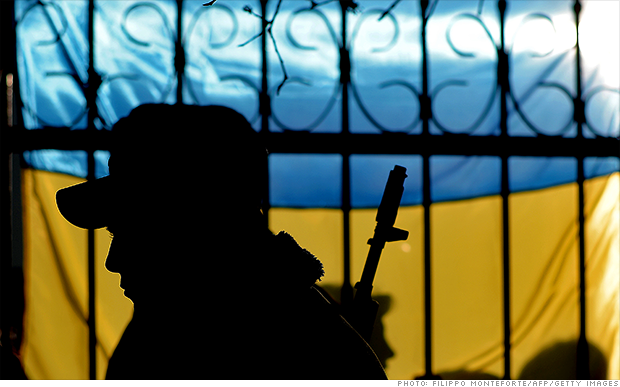
Russia's military intervention in Crimea has led to a tense standoff with Ukrainian forces in the peninsula.
LONDON (CNNMoney)
Topping the agenda is finalizing a $15 billion package of financial aid for Kiev and possibly finding ways to exert pressure on Moscow over its military intervention in Ukraine's Crimea region.
The emergency summit follows a day of talks between foreign ministers in Paris aimed at securing access for international observers to Crimea, where ethnic Russians make up 60% of the population, and Moscow's agreement to return its forces to their bases.
In the absence of a breakthrough on the diplomatic front, some European officials have raised the possibility of sanctions, which would almost certainly prompt retaliation against Western business interests by Russia.
The United States introduced a visa ban Thursday for Russian and Ukrainian individuals that played a role in threatening Ukraine's sovereignty, but hasn't named names yet.
President Obama also signed an executive order laying the groundwork for further sanctions against individuals and entities responsible for the crisis.
White House Press Secretary Jay Carney called the order "a flexible tool that will allow us to sanction those who are most directly involved in destabilizing Ukraine."
However, European leaders have been more circumspect because of the deep economic and trade ties with Russia. EU members of the G8 have decided to suspend preparations for June's summit in Sochi, host last month of the Winter Olympics.
Related: Who would suffer from Russian sanctions
The European Commission announced the proposed aid package for Ukraine on Wednesday with the aim of helping the country stabilize its economy and finances and work toward political and economic reforms.
Ukraine has been running short of cash and experts have predicted that it could default as early as this month on billions of dollars in debts. It already owes Russia nearly $2 billion for natural gas imports and said Wednesday it was unable to pay its gas bill for February.
Ukrainian leaders said last month the country needed $35 billion in aid over the next two years. A team from the International Monetary Fund arrived in Ukraine this week to explore the options for further financial assistance.
IMF support will come at a price. The country will have to implement tough reforms -- including reducing subsidies to residents for natural gas, and cutting spending elsewhere -- and tackle corruption.
Related: Why Europe will balk at Russian sanctions
The crisis in Ukraine kicked off late last year when the now-ousted president Viktor Yanukovych suspended talks on a planned EU trade deal and instead opted for closer ties with Russia.
At the time, Russia offered Ukraine about the same level in aid that the EU is now pledging the beleaguered nation.
The move toward closer ties to Russia backfired as pro-Western protesters crowded onto the streets in Ukraine, eventually leading to an uprising that caused Yanukovych to flee. ![]()
First Published: March 6, 2014: 1:50 AM ET
Anda sedang membaca artikel tentang
EU leaders talk Ukraine aid, Russia sanctions
Dengan url
http://bolagaya.blogspot.com/2014/03/eu-leaders-talk-ukraine-aid-russia.html
Anda boleh menyebar luaskannya atau mengcopy paste-nya
EU leaders talk Ukraine aid, Russia sanctions
namun jangan lupa untuk meletakkan link
EU leaders talk Ukraine aid, Russia sanctions
sebagai sumbernya
0 komentar:
Posting Komentar